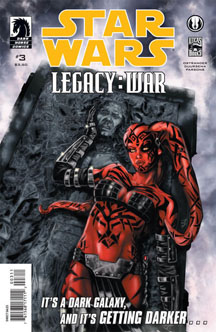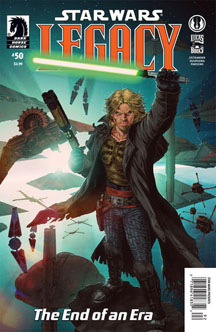Writer John Ostrander brings together all the myriad factions of “Legacy” in two final, epic arcs – “Extremes,” Issues 48-50 (2010), and the six-issue miniseries “Legacy: War” (2010-11). The Fel Empire, the Galactic Alliance and the Jedi unite against the Sith Empire. Additionally, the non-Sith members of the Sith Empire finally realize the Sith are 1) evil and 2) using them for their own ends, and they defect to the Allied forces.
Considering the care with which Ostrander – with a serious assist from main artist and co-creator Jan Duursema – constructed the geopolitics of “Legacy,” it’s perhaps nitpicky to bring up an underexplored group: the citizens of the galaxy. Granted, earlier in the series, we saw some refugees when they are in the war’s crosshairs: the Mon Calamari, who lose 80 percent of their population to a Sith poison. Other than that, John Q. Public is invisible in “Legacy.”
And yet Average Joe and Average Jane are at the heart of “War” when Emperor Roan Fel argues for the use of the poison Omega Red to wipe out the entire Coruscant populace. Darth Maladi, a captive of Fel’s Empire, says she’ll give the bioweapon to Fel if he’ll kill Cade Skywalker for her. Omega Red is the next evolution of Alpha Red, from the “New Jedi Order” series, which was designed to wipe out the entire Yuuzhan Vong species. In that book series, characters discussed whether Alpha Red was a morally allowable weapon of war, and the debate picks up between Fel and Imperial Knight Antares Draco here.
Fel: “There are no innocents on Coruscant! They are all collaborators with the Sith!”
This raises an interesting question: How far should we extend responsibility for a government’s actions? A couple “Legacy” flashback posts ago, I looked at the question of whether “just following orders” absolves one from moral guilt over an evil act, or if a soldier should also look at the morality of what he is ordered to do. That continues to be a central theme of these final issues. Indeed, Draco reluctantly kills Fel, citing a moral duty that supersedes following orders: “If the emperor himself strays, to bring him back to the light – or kill him if he will not (come back to the light).”
Modern thought about responsibility of a government’s evils almost always includes those in leadership positions, and it sometimes (but rarely) encompasses soldiers who are carrying out orders. But it almost never extends to the citizenry at large, which is why we as readers automatically reject Fel’s claim in the quote above.
In the United States, we are presented with a choice every tax season: 1) pay taxes according the rules set forth by the government, or 2) go to prison. So when a Yemeni village is drone-bombed by the U.S. military, we as citizens paid for it, but I argue that we bear no moral responsibility because we weren’t given the option to not pay for it (other than going to prison). By the same logic, I don’t blame a Coruscant citizen for the Sith’s atrocities, even though they are funding it. (Sith tax structure is not outlined in “Legacy.” But I am assuming for the sake of argument that Sith Empire citizens don’t fund their government out of the goodness of their hearts. In fact, I assume tax cheats are summarily executed.)

Bringing this topic full circle, I think government leaders should be held morally responsible for their actions, regardless of their reasoning for doing so. Roan Fel is using a classic “ends justifies the means” argument when he says: “There is no weapon I would not use to defeat Darth Krayt!” To Fel, the death of all Coruscanti is within the bounds of allowable collateral damage, just as the U.S. military has an “acceptable loss” threshold when planning drone strikes in the Middle East.

On a more personal level, “Legacy: War” gives us Cade vs. Krayt, Round III. I was somewhat surprised to see Cade declare “I know who I am. I’m a Jedi!” I had always admired Cade for being suspicious of all governments (or quasi-governmental agencies, in the case of the Jedi Order). On the other hand, the Jedi Order of Cade’s time perhaps shouldn’t be equated with the Jedi Order that nearly expels Ahsoka Tano on a false charge in “The Clone Wars” TV series. But on yet another hand, K’Kruhk and T’ra Saa are around for both eras.
Ostrander does wisely warn that Darth Krayt’s death does not mean the galaxy will be free from this point forward. Liberty-lovers must always be vigilant, because governmental structures are by their very nature prone to corruption. Indeed, the surviving Sith (including Darths Nihl, Maladi and Talon, plus Wyyrlok’s daughter) intend to “infiltrate governments on every planet” and start the cycle anew.
The problems of making a saga increasingly epic, of feeling like you have to top yourself with each successive battle, creep into these climactic issues. In “Extremes,” Krayt suddenly has cyborg Sith troopers (his way of getting around the loyalty problem inherent with free-thinking Sith) in his ranks, as well as ships those troopers can meld with. (I would’ve been more willing to buy it if I saw Vul Isen or Darth Maladi creating those troopers in past issues.) At the same time, some compelling dramas – notably Azlyn Rae blaming Cade for her condition – are excised from the narrative; that’s not a good trade-off.
And when Cade kills Krayt, how do we know he’s really dead this time? Ostrander’s answer is that Cade will shoot Krayt’s body into Coruscant’s sun. It leads to a poetic callback, though. Having ejected from his ship, Cade floats in space, like he did as a teenager after the Battle of Ossus. Ostrander gives us a poignant play on the galaxy’s most famous surname: “Just me at the end … walkin’ in the sky.”
While “Legacy” got a bit overblown toward the end, it was a great ride that smartly juggled its bevy of characters and organizations without getting confusing (if you read the series in fairly rapid succession). It’s one of only three long-running titles to be planned out and written in a coordinated way, and I give it a slight edge over its competition. John Jackson Miller’s “Knights of the Old Republic” leaned experimental and Randy Stradley’s “Dark Times” leaned poetic (and never reached a conclusion, due to its cancellation), whereas Ostrander’s “Legacy” blended all the elements of the classic trilogy in a fresh way.

